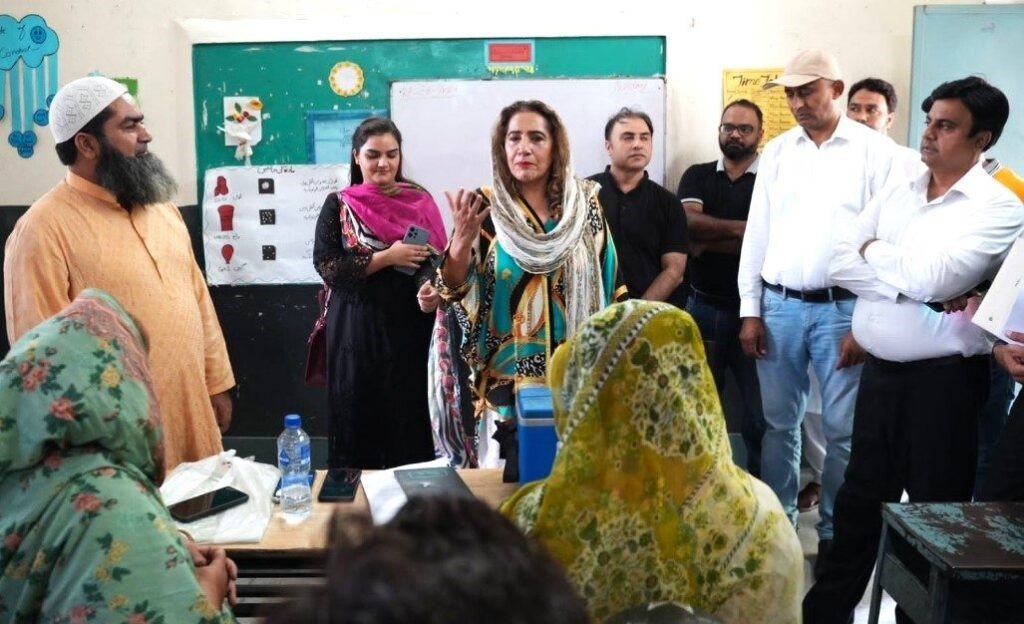CM Punjab’s Focal Person on polio assures the front line workers that the govt would provide all support to improve working conditions and encourages them to deliver results

By our correspondent
LAHORE: In a significant shift towards enhancing the effectiveness of polio eradication efforts through impactful leadership, Uzma Kardar, the Chief Minister Punjab’s Focal Person (CMFP) on Polio, has called for a greater emphasis on promoting women as leaders in the ongoing battle against polio. She underscored that women in leadership roles within polio teams could play a crucial part could ensure that every household reached, especially in challenging and underrepresented areas.
Kardar made these remarks during her address to polio supervisors at a training session organized by the Lahore District Health Management Team at Women College Wahdat Road. This session, part of a broader initiative to enhance the skills and leadership qualities of polio supervisors, focused on empowering female supervisors to take on leadership roles that could bridge the gap between polio teams and communities.
During her visit, Uzma Kardar engaged in in-depth discussions with the polio supervisors, exploring the challenges they face on the ground. By conversing with supervisors across four different batches, she sought their insights and ideas to improve their working conditions and the overall effectiveness of the polio eradication program. She emphasized the critical importance of a heightened sense of responsibility among polio workers, urging them to fully commit to the cause.
The Chief Minister Punjab’s Focal Person reiterated the government’s unwavering resolve to eradicate polio, highlighting that Chief Minister Punjab, Mariam Nawaz, had personally assigned her to understand and address the obstacles hindering polio eradication efforts. Kardar assured the polio workers that the government would provide all necessary support to improve their working conditions but stressed that the onus was on them to deliver results.
“The entire partner staff, as well as government health department officials, are present in the training sessions to ensure you receive up-to-date knowledge and that there is no gap in coordination during the upcoming polio eradication campaign. But it’s crucial that the workers give their 100 percent,” stressed Kardar. One of the key concerns raised by Kardar was the low percentage of government personnel accountable within the polio teams. She urged the district health teams to collaborate closely with allied government departments to increase the involvement of government workers in the polio eradication efforts.
Additionally, Kardar called for improving the quality of training through a dedicated pool of trainers, ensuring that polio workers are well-prepared to face the challenges ahead. In a broader context, Kardar also emphasized the importance of enhanced coordination between Pakistan and Afghanistan—the last two polio-endemic countries in the world. She noted that only through increased cooperation between these neighboring countries could the polio virus be completely eradicated, leaving it with no space to circulate.
Punjab is gearing up for a special polio eradication campaign set to commence on September 9, targeting 13.9 million children across 15 districts. The districts include Attock, Bahawalpur, Bahawalnagar, Chakwal, DG Khan, Faisalabad, Gujranwala, Lahore, Multan, Muzaffargarh, Okara, Rajanpur, Rawalpindi, Rahim Yar Khan, and Sheikhupura. Preparations are already underway, with local-level operational and communication plans being drawn up to ensure the success of this critical campaign.
As Punjab readies itself for this crucial polio drive, the focus on women as leaders in the eradication efforts is poised to make a significant impact. With empowered female supervisors at the helm, the campaign is expected to reach deeper into communities, ensuring that no child is left unvaccinated.



